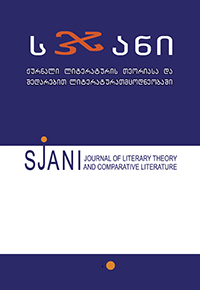ლიტერატურული ტრადიციის გაგება ქართულ მოდერნიზმში
The Understanding of Literary Tradition in Georgian Modernism
Author(s): Konstantine BregadzeSubject(s): Studies of Literature, Aesthetics, Early Modern Philosophy
Published by: ლიტერატურის ინსტიტუტის გამომცემლობა
Keywords: European Modernism; Georgian Modernism; Literary Tradition;
Summary/Abstract: It seems clear from the beginning that the aesthetics of modernism and poetics uniquely should oppose and reject the aesthetics and poetical experience of the past, which the literary avant-garde, in particular, in the Futurist and Dadaist Movement is clearly and unconditionally so. But when in the Modernist literature the re-evaluation of the literary tradition and past values takes place, it is, first of all connected with the literary tradition which operates with the so-called Mimesis principles and, in this case, chronologically precedes modernism -realism and naturalism.But, on the other hand, for the literary modernism the past aesthetic experience is rather important, which in European modernism, is primarily associated with Romanticism and Baroque Poetics and Worldview: For the Literary modernism as an inherently holder of the anti-mimetic aesthetics very important in the past literary tradition is the part that is guided by anti-mimetic principles and which, first of all, was found in the Romanticism and Baroque literature.In the Georgian literary modernism the relation with tradition is the same as in European modernism: its predecessor literary trends - Realism and Naturalism and their poetics and worldview are being refused, but on the contrary it clearly orientates on the literary experience, which supports anti-mimetic principles and mystical-sacral-mythological intentions. Grigol Robakidze’s definition of the concept of Tradition is rather important in this context; According to which for Robakidze important are those literary traditions which raises from the “Metaphysic” roots, seeks to the origins and in this reveals the need of refusing language and poetry. This point is important for Robakidze`s to the extent tha the believes that Georgian modernist aesthetics and literature should develop according to these general principles – to rise from Metaphysical roots, to open them, access and use them. This implies the reduction and denial of language and poetry at the very beginning and refusal of the conventional and anti-mimetic tendencies.In this context important are the texts and manifestos of the Modernists - where tradition is understood like the concept of Robakidze: Expressionist manifesto of K. Gamsakhurdia - “Declaratia Pro Mea”; Paolo Iashvili “Pirveltkma” and Titian Tabidze’s “The Brotherhood of the Blue Horns”.The article deals with the literary-theoretical letters and literary manifestoes ofGrigol Robakidze, Konstantine Gamsakhurdia, and Titian Tabidze and based on it defnesand analysis of how Georgian Modernists understood the essence of Literary Tradition. The article outlines that Georgian modernism differently from Futurism and Dadaism did not entirely stand out from the Georgian Literary Tradition, but on the contrary like the European, so-called Classical Modernism, on the one hand from an aesthetic and political viewpoint principally neglected the general, realist and naturalist, namely Georgian Realistic Aesthetics, Poetics and approach; on the other hand took into account the past Georgian literary tradition and oriented on in aesthetic terms, namely the literary traditions of Rustaveli (Tsisperkhantselebi), Saba (K. Gamsakhurdia), Guramishvili (K.Gamsakhurdia), Besiki (Tsisperkhantselebi). Modernist aesthetics a prior neglects and opposes the conventionalism and regalements of the poetics of realism, hence Modernism objects the principle of mimesis existing in realistic terms and the Illusionary Aesthetics derived from it, as well as the “rational”language, linear plot, monologist narration, technicity of composition, the one-sidedness of the chronotype and its monolithic nature, psychologize the characters, the non-autonomic understanding of the writer, claiming ultimate truth, “ideologism”, determinacy, the illusion of harmony in the world, claiming totality.We believe that the understanding of the concept Tradition according to Georgian Literary Modernism – and Modernism in general – corresponds to the non-mimetic representation of the object and principles, which is in direct contact with the Modernist will to“Transcendentalism of Being” (“Seinszuwachs”) suggested by H.-G. Gadamer:“The internal aim of the research (“At the Foundations of Georgia” – K.B) is caged in the viewpoint that is called “Traditional”. Tradition is a foreign word in French tradition, in German Überlieferung, in Russian: “Predanie”, Georgian: “Expression”. It includes not the traditional understanding of the concept – not like the custom and rituals of this or that tribe, but: visual and active deriving from the metaphysical foundations” (Robakidze IV 2012: 84).The Georgian Modernism (Grigol Robakidze, Konstantine Gamsakhurdia, Titian Tabidze, Galaktion Tabidze, Paolo Iashvili, Valerian Gaprindashvili and others) focus on the coming out of “Metaphysical” roots and striving towards the neglection of the conventional realistic language and allotted poetics and creating a new viewpoint with aesthetic and ethical principles.Georgian Modernists believed that in the on-going situation (the 1910's) the renewal and development of Georgian Literary Modernist aesthetics and poetical principles should heavily lie of metaphysical foundations, their understanding, and application.This in itself meant neglecting conventional language and poetics, refusing mimesis and creating non-mimetic tendencies.
Journal: სჯანი
- Issue Year: 2016
- Issue No: 17
- Page Range: 210-219
- Page Count: 10
- Language: Georgian

